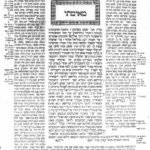
 This would, no doubt, turn into a massive page during the project going through the entire cycle. What I’m going to do is put the section of whichever tractate I’m currently going through on this page, and as I finish them during the cycle, I’ll move the finished one onto a separate linked sub-page. I’m going to organize it as an outline so it’s reasonably easy to follow. I’m also, while well aware of the deep spiritual stuff that’s going on in each discussion, not going to go down that path – there are a zillion websites and commentaries that already do that. In general, I find the idea of a glimpse of a historical culture from what amounts to transcripts of conversations between spiritual and secular leaders to be fascinating, and not surprisingly, for me, I’m particularly drawn to topics that relate to food and wine, sexuality, and comedy.
This would, no doubt, turn into a massive page during the project going through the entire cycle. What I’m going to do is put the section of whichever tractate I’m currently going through on this page, and as I finish them during the cycle, I’ll move the finished one onto a separate linked sub-page. I’m going to organize it as an outline so it’s reasonably easy to follow. I’m also, while well aware of the deep spiritual stuff that’s going on in each discussion, not going to go down that path – there are a zillion websites and commentaries that already do that. In general, I find the idea of a glimpse of a historical culture from what amounts to transcripts of conversations between spiritual and secular leaders to be fascinating, and not surprisingly, for me, I’m particularly drawn to topics that relate to food and wine, sexuality, and comedy.
- Seder Zeraim – “Book of Seeds”
- Berakhot – “Blessings” – Blessed things, actions, and events
- I hit a momentary “WTF?” when Berakhot finished and we didn’t move on to Pe’ah, the next tractate in Zeraim. Apparently the remaining ten tractates in Zeraim do not have Gemara commentary in the Babylonian Talmud, just the Jerusalem Talmud, which the Daf Yomi doesn’t cover. Despite living in a predominately agrarian society, the Babylonian rabbis apparently had nothing to say on agriculture and related subjects like tithing, offerings, and challah bread. Though now I get “Book of Seeds”, I do feel a bit cheated and I want to know if there’s a good challah recipe in there. My plan is to at some point read through the various tractates throughout the Talmud that aren’t included in the Daf Yomi, just out of curiosity. I’ll put those in a different color so that they stand out.
- Pe’ah – “Corner” – Pay it Forward
- Demai – “Doubtful” – Provenance and Taxes
- Kil’ayim – “Mixed Species” – Mixing it up in the Fields
- Shevi’it – “Seventh” – Taking a Sabbatical from Life
- Terumot – “Donations” –
- Ma’aser Rishon – “First Tithes” –
- Ma’aser Sheni – “Second Tithes” –
- Challah – “Dough” –
- Orlah – “First Fruits of Trees” –
- Bikkurim – “First Fruits” –
- Seder Moed – “Book of Festivals”
- Shabbat – “Sabbath” – The Day of Rest
- Eruvin – “Community Spaces” – Creating Shared Space
- Pesachim – “Passovers” – Recreating the Jewish People
- Shekalim – “Shekels” – Taxes of Renewal
- Yoma – “The Day” – Hard to Say I’m Sorry
- Sukkah – “The Hut” – Founding the Jewish Nation
- Beitza – “The Egg” – Making it all Social
- Rosh Hashanah – “Head of the Year” – Finding Yourself in Time
- Ta’anit – “The Fast” – Hunger Strikes
- Megillah – “Scroll” – Rules of the Read
- Mo’ed Katan – “Little Festival” – What Can You Do?
- Chagigah – “Festival Offering” – Nu, What Can I Bring?
- Seder Nashim – “Book of Women”
- Yevamot – “Brother’s Wife” – Clan Survival
- Ketubot – “Written” – I Do
- Nedarim – “Vows” – I Won’t
- Nazir – “Abstinent” – I’m Yours Forever… or a Month
- Sotah – “Errant Wife” – How Can I Trust You Again?
- Gittin – “Divorce Documents” – Parting Glances
- Kiddushin – “Betrothal” – You’re Mine, All Mine!
- Seder Nezikin – “Book of Damages”
- Bava Kamma – “The First Gate” – Who’s Responsible?
- Bava Metzia – “The Middle Gate” – Who Owns the Truth?
- Bava Batra – “The Last Gate” – You’re Responsible, and Here’s Why
- Sanhedrin – “Assembly” – Judging You
- Makkot – “Lashes” – Whip It, Whip It Good
- Shevu’ot – “Oaths” – Swear to God!
- What exactly is an oath and how does it differ from, say, a promise, pledge, vow, word of honor, or guarantee, to give a few similar examples? At it’s simplest, and the reason it garners its own tractate, is that an oath is a promise made invoking a covenant with a higher authority, usually a deity. This tractate explores the details of making and breaking of oaths, and the various types of oaths, including those made frivolously.
- 6/9/25, Chapter 6, Page 39 – If someone is guilty of committing a serious offense, both he and his family are punished with excommunication, unless his family are the ones who turned him in, otherwise it is assumed they, at the least, covered for him if not actually abetted him. However, punishments, less severe, are also meted to his friends and neighbors, and, in spirit, to the rest of the world, in every decreasing increments of punishment as the circle ripples out from him as the center. Except the 36 righteous souls on the planet at any given time. They’re exempt. Interestingly, even if they, too, did nothing to stop him.
- 6/10/25, Page 40 – A plaintiff comes before the rabbinical court and claims that the defendant owes him X amount of money. The defendant claims there is no such debt. The rabbis rule that if X amount is over a certain minimum, they must both swear oaths, to God. But then they sort of lose the plot, as they muse that no plaintiff would make up such a debt out of whole cloth (and swear a sacred oath), so maybe it’s a debt but less than X; while at the same time musing that no defendant would deny a real debt completely, so maybe it’s some fraction of X (and similarly swear). And then they all seem to wander off, self-assured that they’ve had insights.
- 6/11/25, Page 41 – Oaths which are administered under Torah law, that is, they’re spelled out in the Torah, give the court the right to enforce violations of the oath by entering the person who swore a false oath’s property. Oaths administered under rabbinic law, the extensions of Torah law, do not confer that right to the court, it becomes a civil matter between the rabbi administering the oath and the oath swearer. The rabbi basically has to resort to coercion or some sort of repo guy to do things, which may or may not be legal according to the court.
- 6/12/25, Page 42 – Sometimes someone doesn’t have money to repay a loan, or product to repay something borrowed, and they repay in something of equal value that is accepted by both parties. But, beware, warn the rabbis, make sure there are witnesses to that agreement and transaction, as without the evidence of the return of the “in kind” money or item, you may have no proof you repaid, nor of the agreement on what that repayment was worth.
- 6/13/25, Page 43 – In order for a defendant to be required to swear an oath in regard to an item left for safekeeping, the item must be “moveable”, and therefore cannot be land, or a fixture on the land (which included slaves), or something which has no intrinsic value (a promissory document, for example, which in itself isn’t worth anything). It also must be describable in specific weight, size, and/or number. You know, like all those exacting Talmudic measurements we’ve explored, like “an olive bulk” or “a loaf of bread”. At least none of them were measuring distances in “school buses” or “blue whales”.
- 6/14/25, Page 44 – Throughout the past pages, the focus as been on a defendant swearing an oath against a claim. And, in fact, the Torah only specifies oaths for defendants. The rabbis, however, extend this to certain claimants, such as an employee who says he hasn’t been paid, or a debtor who says his collateral has not been returned after repaying a loan. The big argument is over where the oath can be accepted in two disparate situations – the defendant, in these examples the employer or loaner, admits that the debt ever existed versus one who admit it did but claims it has been repaid in full or part. Different sages rule differently, of course.
